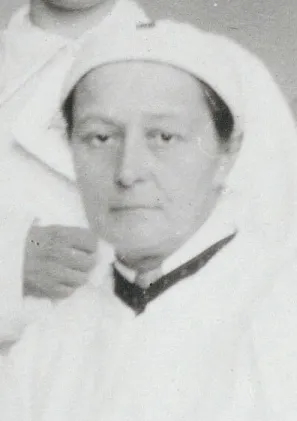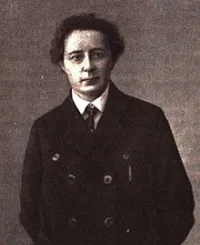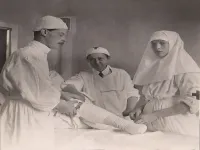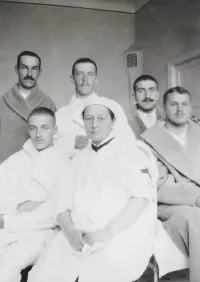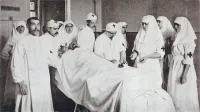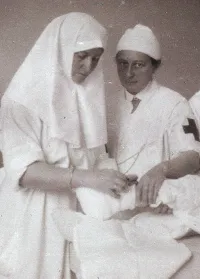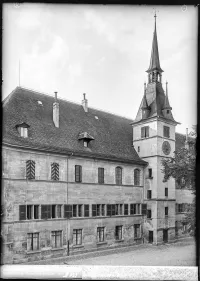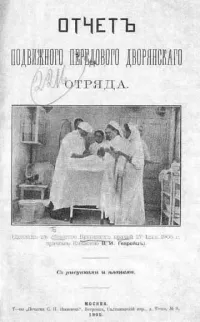Biography
1870 - 1932
She was born Princess Vera Gedroits into the Giedraitis family of the Grand Duchy of Lithuania on April 7, 1870. Expelled from finishing school because of revolutionary activities, the brilliant Princess Vera was instead trained to be a surgeon at the University of Lausanne in Switzerland. She returned to Russia in 1900 due to family tragedies which included the death of her sister. At age thirty she became the first female surgeon in Russia. During the Russo-Japanese War (1904) she outfitted a railway car as a makeshift operating room. There Dr. Gedroits performed laparotomies (a surgical procedure of incision through the abdominal wall to gain access to the abdominal cavity) on dozens of patients. Her astounding success rate led the Russian army to adopt the procedure, with the eventual result of changing the way abdominal wounds were treated thereafter. Her success was partially attributed to her insistence that the operation be performed on patients only within three hours of initial injury. In 1909, Dr. Gedroits transferred to the court hospital where she became surgeon to the Imperial family. There she also joined the Poets' Guild and published her poems as under the name Sergei Gedroits. After the February Revolution in 1917, which led to the overthrow of czarist rule, Dr. Gedroits went to work on the WWI front before eventually settling in Kiev with her lover, Countess Maria Nierodt. A true scholar, Gedroits not only practiced medicine, but also wrote papers on oncology, pediatric surgery, and endocrinology. In 1921 she took a teaching position at the Kiev Medical Institute and two years later was selected for a post as professor, becoming one of the first female professors of surgery in the world. By 1930 she was the head chair of faculty surgery at the institute. She died of cancer at age 56 in 1932 and was buried in her native city.
1870 - 1932
She was born Princess Vera Gedroits into the Giedraitis family of the Grand Duchy of Lithuania on April 7, 1870. Expelled from finishing school because of revolutionary activities, the brilliant Princess Vera was instead trained to be a surgeon at the University of Lausanne in Switzerland. She returned to Russia in 1900 due to family tragedies which included the death of her sister. At age thirty she became the first female surgeon in Russia. During the Russo-Japanese War (1904) she outfitted a railway car as a makeshift operating room. There Dr. Gedroits performed laparotomies (a surgical procedure of incision through the abdominal wall to gain access to the abdominal cavity) on dozens of patients. Her astounding success rate led the Russian army to adopt the procedure, with the eventual result of changing the way abdominal wounds were treated thereafter. Her success was partially attributed to her insistence that the operation be performed on patients only within three hours of initial injury. In 1909, Dr. Gedroits transferred to the court hospital where she became surgeon to the Imperial family. There she also joined the Poets' Guild and published her poems as under the name Sergei Gedroits. After the February Revolution in 1917, which led to the overthrow of czarist rule, Dr. Gedroits went to work on the WWI front before eventually settling in Kiev with her lover, Countess Maria Nierodt. A true scholar, Gedroits not only practiced medicine, but also wrote papers on oncology, pediatric surgery, and endocrinology. In 1921 she took a teaching position at the Kiev Medical Institute and two years later was selected for a post as professor, becoming one of the first female professors of surgery in the world. By 1930 she was the head chair of faculty surgery at the institute. She died of cancer at age 56 in 1932 and was buried in her native city.
Demography
Demography
Gender Female
Sexual Orientation Lesbian
Ethnicity Caucasian/White
Faith Construct Russian Orthodox
Nations Affiliated Russia Switzerland Ukraine
Era/Epoch Interwar Period (1918-1939) Progressive Era (1890-1920) Russia Empire (1721-1917) Soviet Russia (1917-1922) Soviet Union (1922-1991) World War I (1914-1918)
Field(s) of Contribution
Academics
Author
Education
Medicine
Military
Poet
Royalty
World History
Commemorations & Honors
Hospital in Fokino Bryansk Oblast Russia Named in Gedroitis' Honor
Memorial Plaque Dedicated to Gedroitis at the Site of the Former Tsarskoe Selo Palace Hospital in Pushkin Saint Petersburg
Google Doodle Commemorating Gedroitis' 151st Birthday (2021)
Demography
Gender Female
Sexual Orientation Lesbian
Ethnicity Caucasian/White
Faith Construct Russian Orthodox
Nations Affiliated Russia Switzerland Ukraine
Era/Epoch Interwar Period (1918-1939) Progressive Era (1890-1920) Russia Empire (1721-1917) Soviet Russia (1917-1922) Soviet Union (1922-1991) World War I (1914-1918)
Field(s) of Contribution
Academics
Author
Education
Medicine
Military
Poet
Royalty
World History
Commemorations & Honors
Hospital in Fokino Bryansk Oblast Russia Named in Gedroitis' Honor
Memorial Plaque Dedicated to Gedroitis at the Site of the Former Tsarskoe Selo Palace Hospital in Pushkin Saint Petersburg
Google Doodle Commemorating Gedroitis' 151st Birthday (2021)
Resources
Resources
https://en.wikipedia.org/wiki/Vera_Gedroits
https://www.bmj.com/content/bmj/305/6868/1532.full.pdf
https://www.bbc.com/future/article/20190418-the-princess-who-transformed-war-medicine
https://prabook.com/web/vera_ignatievna.gedroits/3775307
https://academicinfluence.com/people/vera-gedroits
Resources
https://en.wikipedia.org/wiki/Vera_Gedroits
https://www.bmj.com/content/bmj/305/6868/1532.full.pdf
https://www.bbc.com/future/article/20190418-the-princess-who-transformed-war-medicine
https://prabook.com/web/vera_ignatievna.gedroits/3775307
https://academicinfluence.com/people/vera-gedroits
